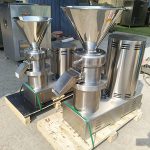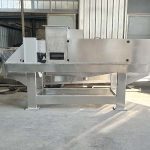
How to Lower the Temperature of Colloid Grinder?
02/25/2025
Sawdust Dewatering Machine
03/25/2025
How to Lower the Temperature of Colloid Grinder?
02/25/2025
Sawdust Dewatering Machine
03/25/2025Choosing the right industrial juicer machine is essential for maximizing juice yield and maintaining high product quality. Different fruits and vegetables require specific processing techniques, such as de-pitting, crushing, or pre-cooking, to achieve optimal results. As a global leader in industrial juicing solutions, Furui Machinery has helped over 500 clients around the world. Here we share expert insights in this FAQ, including the best juicing methods, equipment selection, and processing recommendations for a wide range of produce. Whether scaling production or refining quality, find your solution here.
FAQs About Industrial Juicer
Here are some frequently asked questions from our clients. If you have specific material to process or need technical support, please contact our team for help!
1 What types of industrial juicer machines does Furui Machinery offer?
Furui Machinery offers screw type juicer (LZ and PZJ series); lemon and orange juice machine (DG series); passion fruit juicer and pulper machines.
2What is the capacity range of the industrial juicer machines?
Generally, 0.5 to 3 tons/h, depending on the model and type of produce being processed.
3What materials are used in the construction of the machine?
Our juicer machines are made of food-grade stainless steel (SS304 or SS316) to ensure durability and hygiene.
4Can all fruits be processed with a juicer machine?
In general, small fruits (like blueberries, strawberries) can be juiced directly. Most fruits need to be pre-processed before juicing. For example:
1. Fruits with large pits (peach, mango, cherry, plum, apricot, bayberry, etc.) require a de-pitting juicer to remove the seed before juicing.
2. Larger fruits (like apples and pears) should be pre-cut into smaller pieces or processed using a juicer with crusher (like PZJ series) for better efficiency.
1. Fruits with large pits (peach, mango, cherry, plum, apricot, bayberry, etc.) require a de-pitting juicer to remove the seed before juicing.
2. Larger fruits (like apples and pears) should be pre-cut into smaller pieces or processed using a juicer with crusher (like PZJ series) for better efficiency.
5What is the difference between juice from a juicer and a pulper?
Juicer: Produces clearer juice with less pulp.
Pulper: Produces thicker juice with more fruit solids, giving a higher viscosity.
Pulper: Produces thicker juice with more fruit solids, giving a higher viscosity.
6Which machine is best for juicing leafy vegetables?
Both juicers and pulping machines can process leafy and stem vegetables (e.g., celery). However, pulping machines are recommended because they achieve a higher juice yield and better texture. If using a juicer, the vegetables must be finely chopped (around 3mm) before juicing.
7Can one machine handle multiple types of fruits and vegetables?
Yes. For example, the screw press juicer is ideal for extracting juice from ginger, pineapples, apples, grapes, and other fruits and vegetables. The citrus juicer is specifically designed for juicing oranges, lemons, limes, kumquats, and similar citrus fruits.
If you're unsure which machine is best suited for your materials, feel free to consult us - we’ll help you find the right solution for your processing needs.
If you're unsure which machine is best suited for your materials, feel free to consult us - we’ll help you find the right solution for your processing needs.
8Is there a juicer for all fruits and vegetables?
Actually, there’s no single juicer that perfectly handles every fruit and vegetable due to differences in texture, fiber content, and moisture levels. You can contact our team for professional advice.
9What are the best juicing methods for pineapples?
Screw type juicer (LZ and PZJ series) is ideal for making pineapple juice. But the pineapples must be peeled and cut into pieces before juicing.
10What factors affect juice yield and efficiency?
1. Fruit Size: Smaller feed sizes improve yield.
2. Pre-processing: Crushing or de-pitting improves efficiency and yield.
3. Fruit Variety: High-water-content fruits yield more juice.
2. Pre-processing: Crushing or de-pitting improves efficiency and yield.
3. Fruit Variety: High-water-content fruits yield more juice.
11How to produce fruit pulp or puree instead of juice?
If you want thick fruit pastes like apple puree or pear puree, pre-cook the fruits first before being processed with a pulping machine.
12What is the recommended juicing process for apples and pears?
If you want clear juice, a screw type juicer is recommended for a higher yield.
If you want puree, pre-cook the materials first then use a fruit pulping machine to achieve a high-viscosity fruit puree.
If you want puree, pre-cook the materials first then use a fruit pulping machine to achieve a high-viscosity fruit puree.
13What juicing equipment is recommended for sugar beets?
Sugar beets should first be crushed with a crusher and then processed using a screw press machine due to their hardness.
14What is the typical juice yield of an industrial juicer?
Juice yield depends on the type of produce and juicing method, typically ranging from 70-85%.
15Can a juice production line handle different fruits?
Generally, no more than 2 kinds of fruits for a juice production line.
16Is the machine easy to clean?
Yes, our machines feature easy-to-clean designs with removable parts and stainless steel materials.
17Can the juicer machine be customized?
Yes, we offer customization options, including different capacities, juice extraction methods, and additional features like washing, automatic feeding, pulp separation, and filling.
18Is technical support available?
Yes, Furui Machinery provides technical support, installation guidance, and after-sales service to ensure smooth operation.
19 What is the lead time for delivery?
Standard models are typically ready within 7-15 days, while customized machines may take longer.
20How can I order an industrial juicer machine?
You can contact us with your processing requirements, including what fruit or vegetables you will process, the desired capacity, and the desired output (juice or pulp). Then we will recommend the best juicer or pulping machine for your needs.

